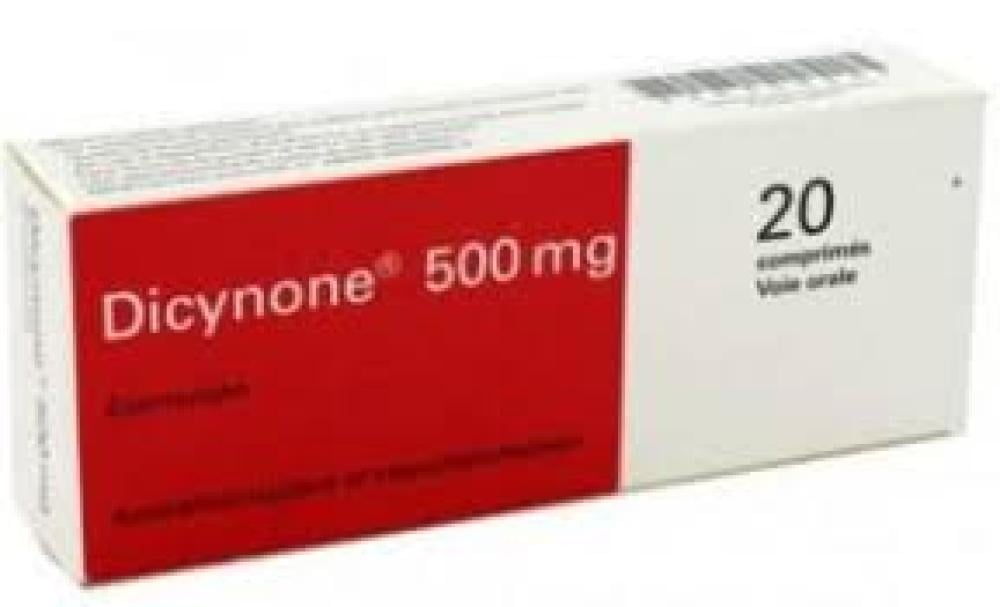Etamsylate 500 mg tablets
What is Etamsylate and what is it used for?
- Etamsylate belongs to a group of medicines called antihemorrhagic, antifibrinolytic, and amino acid-lowering drugs.
- Etamsylate is used in adults and children over 1 year of age to prevent and treat bleeding due to a process that prevents blood clotting called fibrinolysis.
Specific uses include:
- Heavy menstrual periods in women.
Gastrointestinal bleeding;
- Bleeding urinary tract disorders after surgery on the prostate gland or urinary tract.
- After surgery on your ear, nose, or throat.
- After heart, abdominal, or gynecological surgery.
- Bleeding after treatment with another drug to break up blood clots.
What you need to know before using Etamsylate:
Do not use Etamsylate:
Tell your doctor if any of the following apply to you before you start using this medicine:
- You are allergic (hypersensitive) to etamsylate or any of the other ingredients of this medicine
- You have or have ever had a condition that causes blood clotting.
- You have a condition called 'consumption coagulation' where the blood throughout your body starts to clot.
- You have kidney problems.
- You have a history of convulsions (seizures).
Warnings and Precautions:
You should tell your doctor if:
- If you have blood in your urine, which may indicate a clot in your upper urinary tract.
- If you are at risk of blood clots.
- If you have excessive clotting or bleeding throughout your body (disseminated intravascular coagulation), your doctor may perform a blood test to see if the process that prevents blood clotting (called fibrinolysis) has been activated;
- If you have convulsions (seizures). Your doctor will use the lowest possible dose to avoid further convulsions after treatment;
- If you are taking long-term treatment with etamsylate, be careful to monitor your color vision for any possible changes. If necessary, your doctor may discontinue treatment. Regular eye exams are recommended for long-term treatment with etamsylate. If changes in your eyes are noticed, your doctor may consult an ophthalmologist to decide whether to continue treatment.
Other medicines and Etamsylate:
- Tell your doctor about the medications you are taking, especially if you are taking:
- Other medications that help blood clotting, called antifibrinolytics.
- Medicines that prevent blood clotting are called thrombolytic drugs.
- Oral contraceptives.
How to use Etamsylate:
- Your doctor will decide the correct dose for you and how long you should take it.
Use in adults:
Treatment of local fibrinolysis:
- The usual dose is 500-1000 mg three times a day.
Treatment of general fibrinolysis:
- The usual dose is 1000 mg every 6 to 8 hours or up to 15 mg per kg of body weight.
Use in children:
- The doctor will decide the appropriate dose for your child and how long he or she should take it.
- If Etamsylate is given to a child over 1 year old, the dose will depend on the child's body weight.
Use in the elderly:
- It is not necessary to reduce the dose unless you have kidney problems.
- Use in patients with kidney problems
- If you have kidney problems, the dosage may be reduced. Your doctor will decide the appropriate dosage based on a blood test.
Possible side effects:
Stop using the product and seek immediate medical attention if:
- Swelling of the face, lips, tongue, or throat, which may cause difficulty breathing or swallowing
- Signs of blood clots
How to store Etamsylate:
- Keep all medicines out of the reach and sight of children.
- Do not store above 25°C. Store in the original package. Do not refrigerate or freeze.
- Do not use this medicine after the expiry date shown on the blister.
- Do not dispose of medications down the drain or in the trash. Ask your pharmacist what to do with any medications you no longer need. This will help protect the environment.
- The dosage form and route of administration of Etamsylate should be prescribed according to the therapeutic indication and severity of the disease for each individual patient.

